Ayanna Webster-Roy: 'We are stronger as one nation'
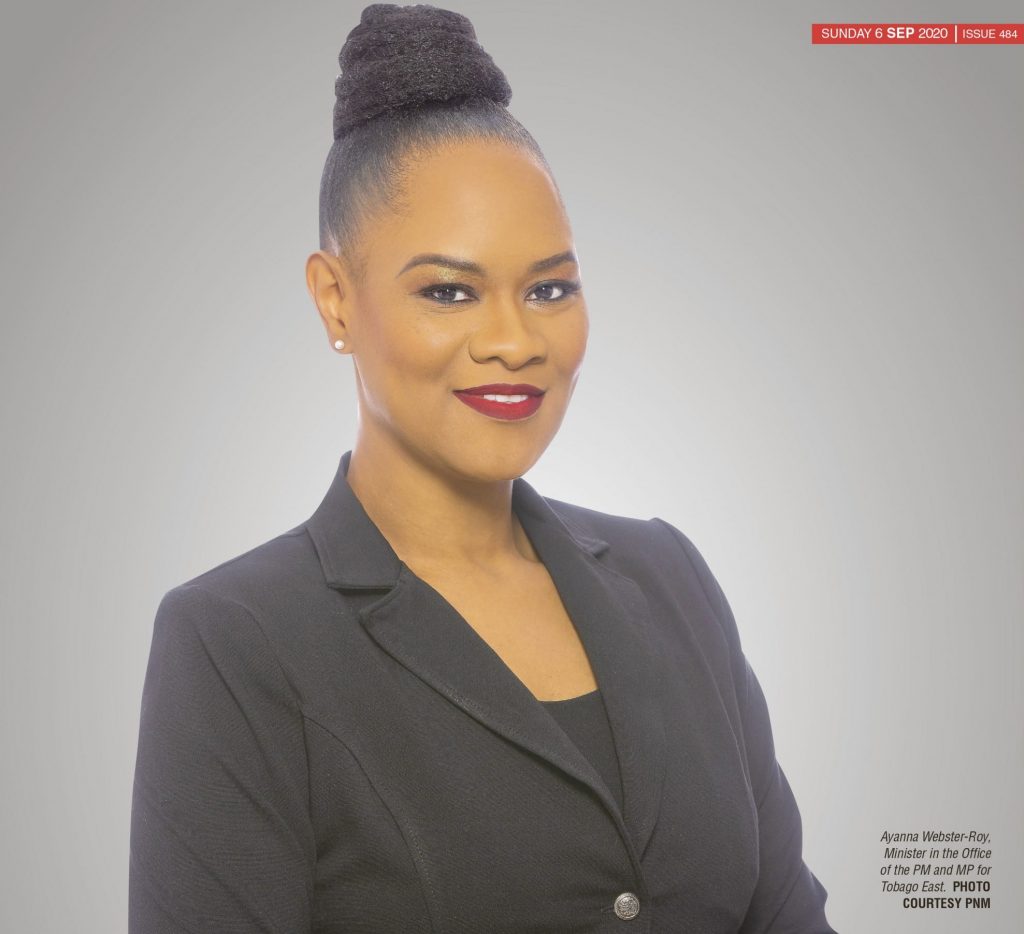
Ayanna Webster-Roy is proud of the work she has done over the past five years as MP for Tobago East, as well as minister in the Office of the Prime Minister, and is thankful that she will get to continue working in both roles.
When she was re-elected Tobago East MP in the 2020 general election, she was excited as she tried her best to represent the people of the constituency in a fair and open manner and with integrity.
“I was really happy that I was given the mandate once more and humbled that the people of Tobago East would have seen it fit to, once again, decide to work with me as I worked with them and for them to improve our constituency.”
Although she retained the seat, defeating her closest rival, Progressive Democratic Patriots (PDP) leader Watson Duke by more than 1,200 votes, she lost ground, getting about 800 votes less than in the 2015 election. In addition, Duke gained approximately 4,000 votes more than he did in the last election.
“Yes, we would have lost some ground, yes, we have work to do. But what it speaks to is the coming together of everyone who was naturally opposed to the PNM (People’s National Movement) voting for the PDP.”
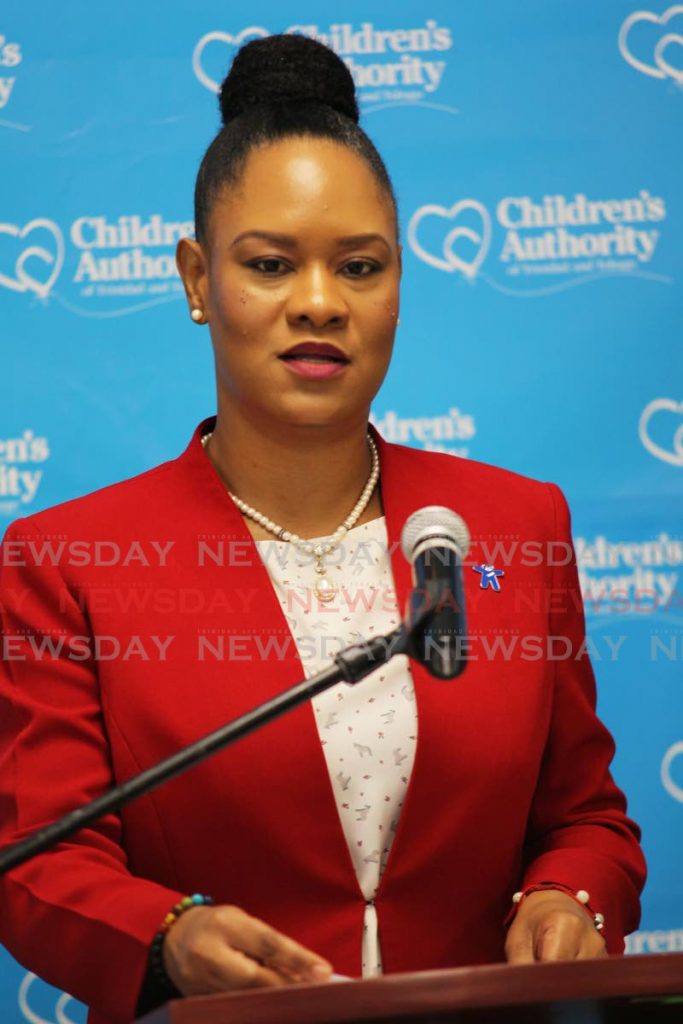
She believed one of the contributing factors was that as the minister for Tobago affairs, she was at the forefront of closing the ministry of Tobago development, a creation of the 2010-2015 People's Partnership administration, and a number of people were laid off as a result.
In addition, she said people liked the idea of a Tobago party for Tobago people, especially those who want Tobago to be independent from Trinidad. However, she did not believe in Tobago secession because there were benefits to the union.
“Yes, we want more autonomy, we want to be able to have more say and more control over certain aspects of our governance processes in Tobago. But at the end of the day, my personal view is that we are stronger together as Trinidad and Tobago.”
She said together the islands were stronger in terms of international negotiations and even the economy, as each island could bolster the other in difficult times.
And while there may be oil and gas in TT’s waters, right now oil prices were extremely low. She also gave the example of what was happening to the Tobago economy with covid19, and tourism being almost non-existent.
Culture, mindset of Tobago people
Webster-Roy said in 2016 she realised people were not making use of the constituency office, so she organised a roving office in order to reach out and take her office to different communities. She also did walkabouts outside the election period, organised a Chai and Chat women’s forum where women could share their experiences and motivate each other, as well as visited schools and partnered with various community-based organisations to assist with different ventures.
One of her challenges, she said, was the culture and mindset of people who expect the government to give them things rather than their taking the initiative to get things done. For example, she said one of the main concerns of people in Tobago East was unemployment.
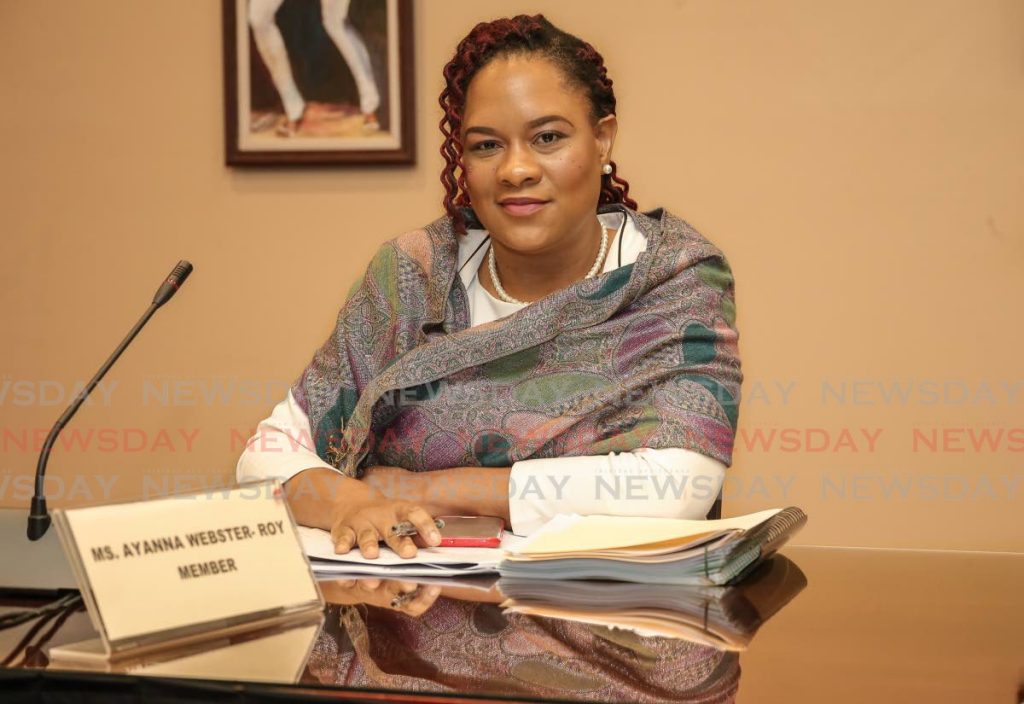
“What I would have tried to do in my walkabouts, and even outside of campaigning, when people ask for jobs, I try to get them to understand that the THA can only employ so many persons, and if we are serious about building a sustainable Tobago, and if we are serious about autonomy, then we have to look to ensuring that we build a private sector that is not only thriving, but one that is sustainable.”
She encouraged people to think about their skills and see how they could turn them into a business or to look for opportunities in their communities which they could monetise, turn into a business and create employment.
People also expressed interest in agriculture, so she intended to collaborate with the THA to push agriculture on the island, not just for food security but also for employment. A hydroponic project was recently launched in her constituency where every few months different people would take charge. Residents would plant and keep the returns from the sale of their crops, then reinvest in the project so other people coming in would have a starter like seeds or seedlings.
“I really like that model and (that is) something that I think that other young persons in other communities in the constituency can emulate.”
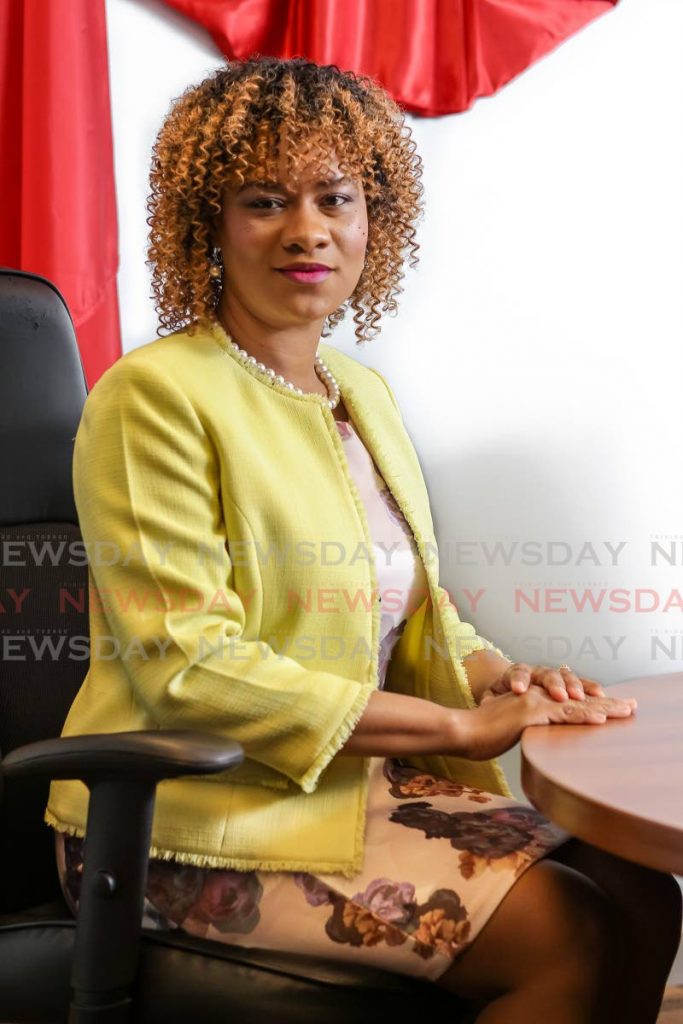
She would also like the THA to work with other agencies to bring 24-hour health care to Charlotteville, or at least extend services to 9 pm. She wants to see fire tenders in different communities in the north of Tobago, with people trained as first responders, since the response time from the Roxborough Fire Station was “not realistic.”
Steps to protect children, women, men
Webster-Roy never moved her things out of her office at the Office of the Prime Minister (OPM), so the day after being sworn in, she went back and continued working.
“I work by faith. I was quietly confident I would be elected again and I was working by faith that I would have the opportunity to continue the work that we would’ve started as a team at the Office of the Prime Minister, Gender and Child Affairs, National Aids Coordinating Committee, and Tobago Affairs.”
She expressed satisfaction that all the policy documents she set out for her teams – the National HIV and Aids Policy, the National Child Policy, and the National Gender and Development Policy – were completed. She said they also achieved many of the “action items” in the midst of challenging economic times, and with small teams.
The team at the OPM, she said, started several projects on which they would continue to work. These included the Spotlight initiative which focused on families and ending violence against women and girls; laying the National Child Policy as a white paper, which would be the first of its kind in the region; and having more state-run shelters for survivors of domestic violence operationalised, including one for men.
One shelter was fully operational and the OPM hoped to open four more. Four would cater to women survivors and their children, as some similar shelters did not allow for male children over a certain age.
“When you come out of a situation where you are being abused by a male figure, even if it’s a young boy, in that new space, it could cause traumatic experiences at times. However, we recognise it’s important to keep the family structure as intact as possible. So we will have shelters for parents with children, because the children too need intervention and support.”
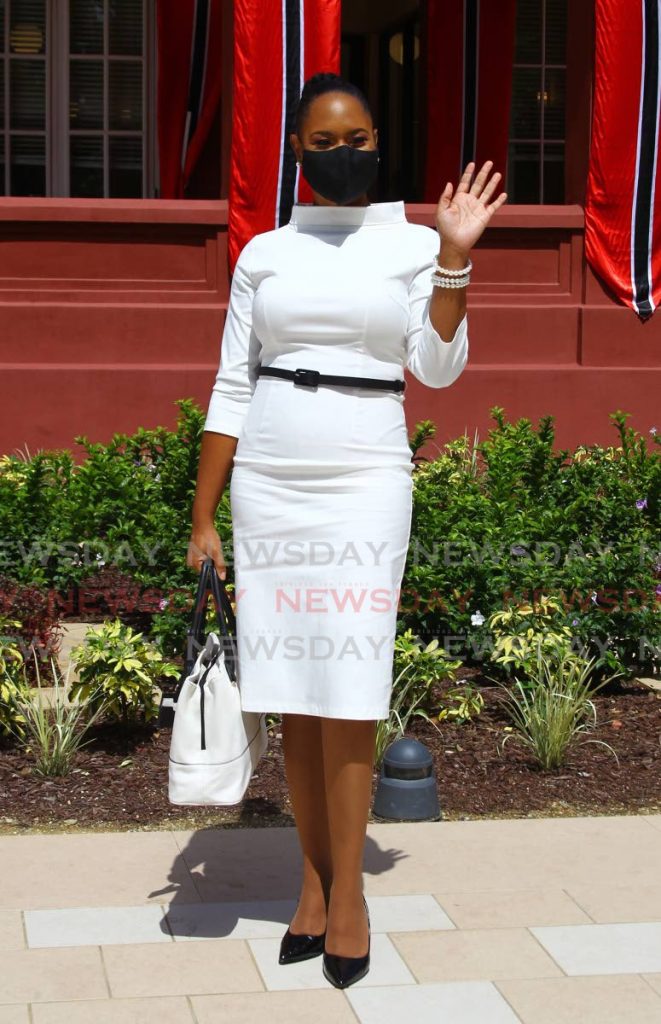
She said the OPM did a lot of sensitisation about violence against women and girls and provided assistance to shelters. It included programmes for men and boys, because “if they are part of the problem, then they have to be part of the solution.”
“We have the gender policy that was done as a green paper, I believe it was in 2018 and within the policy there is a number of different things we intend to do. We also have before Cabinet, and it would still come up, an action plan to end gender-based violence and that is at the policy level. But also, we would’ve laid the amendment to the Domestic Violence Act. We would have put in a number of different remedies in it to address domestic violence.”
She told WMN the gender policy she laid in the Parliament in 2018 was a new document and, even though it was still a green paper, it was being used to guide the work of the government.
“It is different (from previous gender policies) in terms of strategy, where we want to go, ensuring that we address gender-based violence. That policy document would have spoken to the establishment of state-run shelters, the way we communicate and the way we engage all of society. For example, in all our ministries we would have established gender focal points.”
She said gender policy documents were developed in the past but did not progress. One of the main reasons was because of the way gender was defined. She said the definition was and continues to be a contentious issue but up to the day the election was called, no significant objections were filed by members of the public so she hoped the policy would go forward.
Another issue was complaints by men about being discriminated against when trying to access social welfare. So another issue that needed to be addressed was strengthening access to social welfare so the needs of all citizens could be taken care of.
Closing St Michael's School for Boys
She was proud of the impact she feels she made in the House of Representatives, both in debates and through her work on committees. For example, as part of the Public Administrations and Appropriations Committee she championed for those retiring to receive a lump sum up front as part of retiring people’s pensions and gratuities, and the government took up the cause.
However, she was most proud of her decision to close St Michael’s School for Boys, a children's home in Diego Martin. The People’s Partnership administration highlighted several issues and shortcomings at the home, including workers not following the directives of the board, she said, and there was even a recommendation to close it, but nothing was done.
“As a nation, we place children in institutions because we want them to have a better outcome but if we place them somewhere that is similar to where they came from in terms of the abuse, neglect, and so on, we are not doing them any justice.”
She was glad she had prevented other young boys from going to a place where they could have been exposed to more trauma and had no plans to reopen the home. She was also working with the Anglican Church to develop a model for a community rehabilitative institution that would be linked to national service under the Youth Development Ministry.
She added that one of her main challenges is bureaucracy: people do not pay attention to the spirit of policy and instead apply it rigidly across the board, not considering circumstances. That, she said, is hampering the government’s ability to deliver services to citizens quickly.
She said her departments have also fallen short in terms of communication, making sure the public is aware of achievements and the work being done. She said the Communications Ministry started helping her various teams get the information out to the public in a way that is attractive and captures people’s attention and hoped that work would continue.
Building future leaders
Webster-Roy said addressing women’s issues was important, as it would hopefully give women more opportunities to develop and become leaders.
She said women’s experiences and perspectives would never be the same as men’s and by looking at a problem or issue at a different angle, one a man may not have thought of, helped to include different people in society.
“When we have the opportunity to sit at the table of leadership, we are able to advocate and represent from a perspective that looks at the family, looks at the community, and looks at the wider society. When you educate a woman, you educate an entire community – that’s a saying. When you educate a man, you educate an individual. Because we are the first carers, we are the ones who, in the first instance, are charged with the responsibility of nurturing our future leaders, nurturing the persons who are then going to take over the development process later on.”
She believed children may want to emulate women in leadership positions. It also empowered other women to take up leadership roles. So women needed to stop being their own worst critics and instead help each other.
But women first have to step forward to give parties a pool of women from which to choose. She said there was always room for more women to be involved in politics, but it was a difficult decision, because women face more criticism, are viewed differently, and are judged more harshly than men.
She therefore found it commendable that the presiding officers in both houses of Parliament were once again women.
Take covid19 seriously
Webster-Roy believed the spike in the number of covid19 cases was due to carelessness. She said some people had the attitude that “God is a Trini” and they were safe from man-made and natural disasters. It was time for people to be vigilant and to be their brother’s keeper.
“When you’re wearing a mask, you’re not just protecting yourself but you’re protecting those around you who are vulnerable. Wearing a mask is a symbol as well as an affirmative action for us to say that we understand the threat that covid would pose not only to our health and our wellbeing, but to our economy.”
She said with the lack of international travel, tourism, as well as the drop in the price of oil, the economy was volatile. And since covid19 was a threat to people’s health and the economy, people should take it seriously and obey public health guidelines.
“At the end of the day, our public health officials are professionals. They have the experience, they have the knowledge. And while covid is new and we are all learning as we are going along, based on past pandemics, based on their training, they understand what it takes. So we have to listen to them. We can’t use this as an opportunity to question whether or not they are telling us the truth or whether or not they are politically aligned. What we have to do is trust their ability.”
She uses her MP Facebook page to communicate with her constituents and remind them to observe public health guidelines. She plans to reintroduce a virtual public day when she could meet with constituents via Zoom, and will introduce an appointment system for people to visit her office rather than having a crowd of people waiting to be seen. She also intends to stop her roving office until TT flattens the curve.
She said covid19 has been difficult for the people of Tobago but especially for casinos and the tourism sector. Fishermen, hairdressers, food vendors and others were still able to work but with fewer visitors there was less work to be had.
After the first lockdown, the first case of covid19 in Tobago was someone from Trinidad visiting Tobago for a wedding, and that person “changed the covid situation in Tobago.” After the borders closed it relied on local visitors. Now, only essential travel is allowed between the islands, which is an even greater challenge for hoteliers and guest house owners.
Going back to school
Webster-Roy said she herself was still a student. Her first degree was in human resource management with minors in sociology and psychology, and at the moment, she is doing a master’s in institutional innovation and effectiveness which focused on the public sector.
She went into politics to help create a better future for her children, as she did not trust anyone else to do it, and it was her children who made her want to go back to school. She has two daughters and a son, aged from eight to 14. They encourage her when she is upset, or tired, give her pep talks, and the courage to go on.
“I wanted them to see me study and to motivate them, to want to pursue and not to settle.”
She said her family helped her stay true to herself. When she was busy, her husband “holds down the fort,” and her parents and extended family remind her that what she did reflected on them. They kept her grounded and reminded her to keep her integrity.
With so much to juggle, she said she balanced everything by the grace of God.

Comments
"Ayanna Webster-Roy: ‘We are stronger as one nation’"